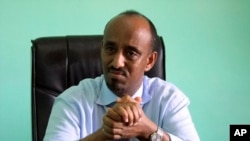NAIROBI —
Somalia’s defense minister says integrating soldiers from clan militias into a national army is the military's biggest challenge as it tries to take control of internal security.
In an interview with VOA from Mogadishu, Somali Defense Minister Abdihakim Haji Mohamud Fiqi said restructuring the Somali national army to reflect the regions of the country is a top priority.
He said new soldiers are being recruited into the ranks from across the country to be trained together and top command posts also will be reformed to represent the diversity of the country.
“We are transforming a clan-based militia into a national defense force, trained and equipped and well disciplined to fight a counter-insurgency and counterterrorism also that will [become] in one or two years [an] international standard army,” said Fiqi.
In March, the U.N. Security Council eased restrictions on selling arms to Somalia, lifting an embargo put in place 20 years ago to stop the sale of weapons to warlords.
Minister Fiqi said the move will help the army to better equip itself, but said more logistical and financial assistance is needed from the international community. He said he hopes the London Conference for Somalia on May 7 will help to cement that support.
“We expect from the London Conference, a well-coordinated international effort to rebuild our national army and security sectors, to be able to take care of our internal security,” said Fiqi.
African Union, Somali, and regional forces have pushed al-Shabab out of major cities, but the militants still control towns and villages mostly in the south.
Al-Shabab proved its ability to continue to strike at the heart of the Somali government, with a coordinated assault on the Supreme Court complex in Mogadishu two weeks ago. More than 30 people were killed in the attack.
Ethiopia, which has troops deployed in Somalia, has signaled its frustration with the pace of military progress in the country.
Ethiopian Prime Minister Hailemariam Desalegn told his country's parliament last week he is anxious to pull troops out of Somalia, as soon as Somali and AU forces take over.
Minster Fiqi acknowledged that the transfer of military control will take time, but said he is confident in Ethiopia’s continued engagement in Somalia.
“And we have no reason to believe Ethiopia’s commitment to a safe and secure Somalia has changed in any way,” said Fiqi. "They know this is as much in their interest as that of Somalia.”
Somalia went through more than two decades of internal conflict without a stable central government, until the current administration was formed last year.
In an interview with VOA from Mogadishu, Somali Defense Minister Abdihakim Haji Mohamud Fiqi said restructuring the Somali national army to reflect the regions of the country is a top priority.
He said new soldiers are being recruited into the ranks from across the country to be trained together and top command posts also will be reformed to represent the diversity of the country.
“We are transforming a clan-based militia into a national defense force, trained and equipped and well disciplined to fight a counter-insurgency and counterterrorism also that will [become] in one or two years [an] international standard army,” said Fiqi.
In March, the U.N. Security Council eased restrictions on selling arms to Somalia, lifting an embargo put in place 20 years ago to stop the sale of weapons to warlords.
Minister Fiqi said the move will help the army to better equip itself, but said more logistical and financial assistance is needed from the international community. He said he hopes the London Conference for Somalia on May 7 will help to cement that support.
“We expect from the London Conference, a well-coordinated international effort to rebuild our national army and security sectors, to be able to take care of our internal security,” said Fiqi.
African Union, Somali, and regional forces have pushed al-Shabab out of major cities, but the militants still control towns and villages mostly in the south.
Al-Shabab proved its ability to continue to strike at the heart of the Somali government, with a coordinated assault on the Supreme Court complex in Mogadishu two weeks ago. More than 30 people were killed in the attack.
Ethiopia, which has troops deployed in Somalia, has signaled its frustration with the pace of military progress in the country.
Ethiopian Prime Minister Hailemariam Desalegn told his country's parliament last week he is anxious to pull troops out of Somalia, as soon as Somali and AU forces take over.
Minster Fiqi acknowledged that the transfer of military control will take time, but said he is confident in Ethiopia’s continued engagement in Somalia.
“And we have no reason to believe Ethiopia’s commitment to a safe and secure Somalia has changed in any way,” said Fiqi. "They know this is as much in their interest as that of Somalia.”
Somalia went through more than two decades of internal conflict without a stable central government, until the current administration was formed last year.




